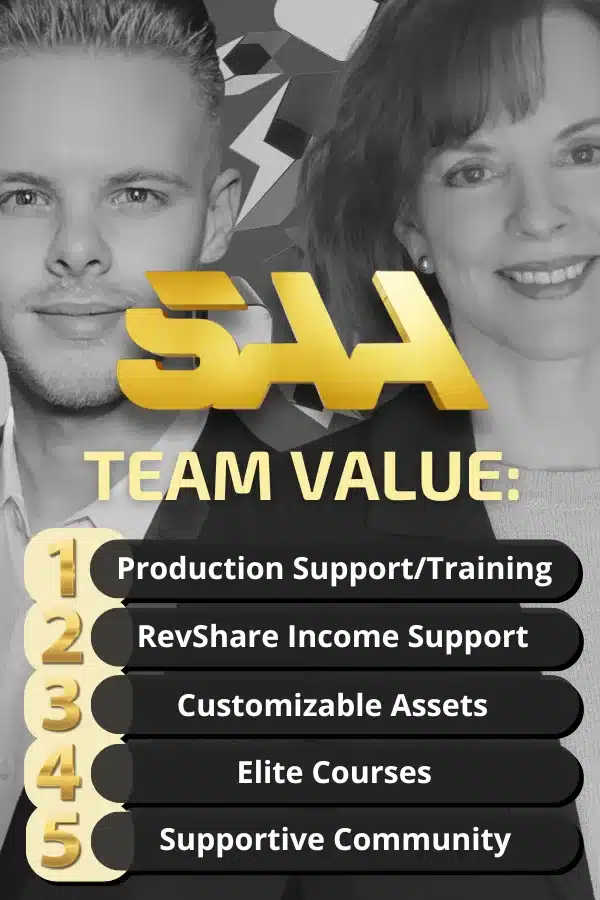Joining a real estate team can offer tremendous benefits, from shared resources to a supportive environment that fosters collaboration. However, to ensure the team aligns with your goals and values, it’s crucial to ask the right questions. By doing so, you’ll position yourself for success and long-term growth. Here is your handy dandy index to this information:
Table of Contents
Key Questions to Ask Before Joining a Real Estate Team:

Here are the essential questions to guide your decision:
1. What Is the Team’s Financial Structure?
Understanding how the team’s financial system works is critical to evaluating your potential earnings. Ask questions such as:
- What is the commission split percentage? Determine how your earnings will be divided and whether the structure is competitive in your market.
- Are there additional fees or costs, such as franchise fees? Clarify any hidden costs that might affect your income, including desk fees or transaction fees.
- Are performance-based bonuses or incentives available? Ask about rewards or additional compensation for achieving specific milestones or surpassing sales targets.
2. What Training and Growth Opportunities Are Provided?
A team that invests in your growth can significantly impact your success. Ask these questions to understand their commitment to professional development:
- What types of training programs are available? Inquire about in-person workshops, online courses, or specialized training sessions.
- Are mentorship opportunities offered? Find out if there are experienced agents who can guide you as you navigate the industry.
- Is there support for obtaining certifications or designations? Check if the team encourages or reimburses continuing education to enhance your skills and credentials.
3. What Will My Role and Responsibilities Be?
Clarity in your role ensures you know what’s expected of you and how you’ll contribute to the team. Consider asking:
- What are my specific responsibilities as a team member? Define your role in transactions, client communication, and other operational tasks.
- What are the collaboration expectations? Ask about how team members work together, whether through shared tasks or joint projects.
- Is there support staff available to assist with administrative tasks? Determine if resources like transaction coordinators or marketing assistants are provided.
4. What Is the Team’s Culture and Work Environment?
A positive team culture can greatly impact your job satisfaction. Learn about the team dynamic by asking:
- What are the team’s core values and mission? Aligning with the team’s ethos can ensure a fulfilling experience.
- Are there team-building activities or events? Check if the team encourages camaraderie through regular gatherings or activities.
- How does the team handle conflicts or challenges? Understanding the conflict resolution approach can reveal the team’s professionalism and supportiveness.
5. What Support and Resources Does the Team Provide?
The tools and support available can greatly affect your productivity. Ask about:
- What marketing materials and technology tools are provided? Ensure you’ll have access to resources like CRM systems, branded templates, or online advertising platforms.
- How is lead distribution handled? Understand whether leads are assigned, pooled, or distributed based on performance.
- Are there systems in place for transaction management? Verify if the team uses tools or staff to streamline closing processes.
6. How Does the Team Acquire Clients?
The team’s ability to generate clients directly impacts your opportunities. Ask these key questions:
- What lead generation methods does the team use? Learn whether the team uses online ads, referrals, cold calling, or other strategies.
- How effective is the team’s marketing strategy? Inquire about their track record and success in attracting high-quality clients.
- What is the team’s market reputation? Research the team’s standing within the community, as this can influence your ability to gain trust and close deals.
Setting Yourself Up for Success

By thoroughly exploring these questions, you can determine whether a real estate team is the right fit for your career goals. The answers will provide insight into the team’s operations, culture, and potential for growth, helping you make an informed decision. Joining the right team can unlock new opportunities, enhance your skills, and set the foundation for a thriving real estate career.
1. Understand Team’s Financial Structure
Start by taking a close look at what the financial structure of the real estate team looks like. Key elements include:
- Commission split percentages
- Additional fees or costs, such as franchise fees
- Performance-based bonuses or incentives
Knowing these details can help you gauge potential earnings.
2. Assess Training and Growth Opportunities
Check what training programs are available. Options might include:
- In-person sessions
- Online courses
- Mentorship opportunities
These can help you grow professionally.
4. Clarify Roles and Responsibilities
Understanding your role is crucial. Check:
- Your specific responsibilities
- Collaboration expectations
- Support staff availability
This clarity aids in fitting into the team structure.
5. Explore Team’s Culture and Environment
Team culture affects job satisfaction. Consider:
- Team-building activities
- Values and mission statements
- Handling of conflicts
These factors influence the working atmosphere.
6. Review Support and Resources Provided
Evaluate resources offered. These might include:
- Marketing materials
- Technology tools
- Lead distribution methods
These resources can boost productivity.
7. Examine Client Acquisition Methods
Client acquisition is key to success. Check:
- Lead generation methods
- Marketing strategy effectiveness
- Team market reputation
These influence your client base.
Team Dynamics and Structure

Analyze Team’s Goals and Achievements
Figuring out what the team’s goals are will help point you in the right direction. Examples of short-term goals would be to increase monthly sales by 10%, or to expand into five new neighborhoods.
Examples of long-term aspirations might be to reach market leadership or double the size of the team. Look at previous accomplishments, such as major sales or accolades, that highlight what this team does best.
For example, the team could measure success by increased sales, improved client satisfaction, or greater brand awareness. Celebrating individual contributions makes each person feel seen and important—and thus more inspired to do great work.
This could take the form of bonuses, public recognition, or expanded responsibilities. The team’s long-term vision and plans to pivot with the changing industry landscape demonstrate its commitment to evolving.
Understand Team’s Performance Metrics
By publicly reporting performance metrics, there is an increased transparency and accountability. Key performance indicators (KPIs) could be the sales volume, customer retention rate or conversion rate on leads.
The team needs to really focus on quantifying and qualifying individual as well as group successes. Transparency around these metrics creates an atmosphere of goodwill and collaboration.
Assess Communication and Collaboration Practices
Regular team meetings, perhaps on a weekly basis, ensure all parties are focused on the same strategies and progress. An environment that encourages honest dialogue fosters a climate of trust and creativity.
Explore Mentorship and Guidance Options
Mentorship can be key, particularly for rookie agents. While programs do differ, having an experienced mentor can provide invaluable experience and guidance. Successful mentorship can hugely increase the success rate of agents.
Lead Management and Expectations
Learn About Lead Sourcing Techniques
We know that real estate teams use a number of different tactics to find leads. These may be social mixers, digital campaigns, word-of-mouth networks, collaborations with community organizations, joint ventures with area businesses and more.
How successful these techniques are usually sets the bar for how qualified those leads created are. It’s important to know where these leads are coming from and where you come into play. For instance, if a team relies heavily on online marketing, you might need to contribute to content creation or manage social media interactions.
With constant shifts in market and buyer behavior, teams need to constantly recalibrate their strategies to stay competitive. A team that leverages next-level analytics to sharpen their strategy indicates a serious focus on iterating towards perfection.
Clarify Expectations for Agents
Performance expectations for agents usually involve meeting quarterly sales quotas and keeping a high percentage of clients in their pipeline. Whatever it is, these expectations should be in writing, easily accessible, and consistently tracked.
Failure to meet expectations may lead to supplemental training or assistance from the team. Accountability and self-motivation is fostered by having skin in the game, through commission bonuses, or winner’s circles or other reward programs.
Exit Strategy Considerations
Discuss Potential Exit Strategies
Whether you’re preparing to join your first real estate team or your fifth, it’s important to think about how a team can help you on your career trajectory. Potential exit strategies include transitioning to an independent agent, joining another team with better commission structures, or pursuing a leadership role. Each choice has distinct career consequences.
It’s equally critical to know what their pathway to advancement looks like on your team. Determine if the promotion criteria match your desired career trajectory. Are you in an environment where the team wants to see you grow and develop? A dedicated team that truly believes in your success can make all the difference in your future endeavors within the real estate industry.
Aligning your own career goals with the interests of the entire team can be key with keeping that momentum going long-term.
Plan for Career Progression
When you are evaluating a team as a potential place to land, look for red flags like high commission splits. Cultural fit is essential to job satisfaction and productivity. A team’s standing with the local market can make or break your business. Just like in business, a strong reputation can help open doors while a weak one can be a deal breaker.
Also, not that with teams, there’s a danger in becoming too dependent on them for leads. If the team leader leaves or the team breaks up, you may be left with no skills to produce business on your own.
Some agents find that they are better off going solo and leave to retain 100% of their commission. Conversely, for some, the discovery that a cap on commission reduces their ceiling on earnings is a light bulb moment. It’s critical to know whether or not you can exit the team while staying with the brokerage.
Key Takeaways
- Before you join a real estate team, understand their commission structure. Confirm any other fees to make sure they’re on par with industry standards and your earning potential.
- Take the time to compare different teams’ compensation packages. Remember to factor in non-monetary advantages, such as health insurance, to find out which one will lead you to the best career path.
- Ask about the quality of the training and mentorship offered by the team, which should help you develop your career and improve your skill set.
- Clarify the specific roles and responsibilities within the team to understand how you will contribute to the overall objectives and how tasks are allocated.
- Interact with the team’s culture, values, and environment. Ensure that they are in line with your own values to help foster a supportive, collaborative team culture.
- Ask about the support and resources provided to team members. This may involve sharing marketing materials, leads, and providing administrative assistance to free you for more revenue-generating activities.
Join Our FREE Team at eXp Realty
Join our team with eXp Realty – the only profitable publicly traded brokerage over the past five years and holds the prestigious title of the best brokerage to work for. The benefits of eXp Realty are unmatched and will truly exceed your expectations!
When you join our team, Smart Agent Alliance, you’ll get more FREE value than you’ll get anywhere else in the real estate business.

Some of What’s included: Access our exclusive SAA Vault Assets to get leads rolling in while you sleep and enhance your business efficiency; attend weekly team video calls filled with invaluable insights and top agent strategies; and receive the Social Agent Academy Program and Investor Army Courses — all of this with more than a $2700 value – absolutely free. And that’s just the beginning! Explore more about our robust team benefits.
Don’t let this opportunity pass you by. Transform your real estate career, maximize your income, and secure your future. Contact us now to schedule a video consultation or email us at team@SmartAgentAlliance.com. We’re here to ensure your success.
Frequently Asked Questions
What should I ask about team dynamics and structure?
Ask what the culture of the team is like, and how the hierarchy is structured. Find out what their decision-making process looks like and whom you’ll be reporting to. This is ideal for measuring whether or not the team is a good fit for your work style and desired career trajectory.
How do I evaluate lead management and expectations?
Find out how leads will be generated and distributed. Be clear about what the team expects from your for lead follow-up and conversion rates. Knowing these will help you establish strong performance baseline expectations.
Why is knowing the exit strategy important?
Have a conversation around exit strategies so you know what your rights and obligations are when you depart. This helps protect your future team, prospects and bottom-line.
What are the benefits of joining a real estate team?
On the positive side, teams provide shared resources, mentorship, and lead opportunities. They have your back and increase your learning, increasing your real estate success.
How does team structure impact my growth?
A defined team structure provides established roles, accountability, and defined career paths. That way you can be assured you’ll be getting support and training to allow you to continue growing in your career.
How can I assess the team’s success rate?
Request metrics regarding the team’s sales and growth. Put these up against industry norms. Most importantly, high success rates are a sign that proven strategies and a climate of collaboration and support are working.








